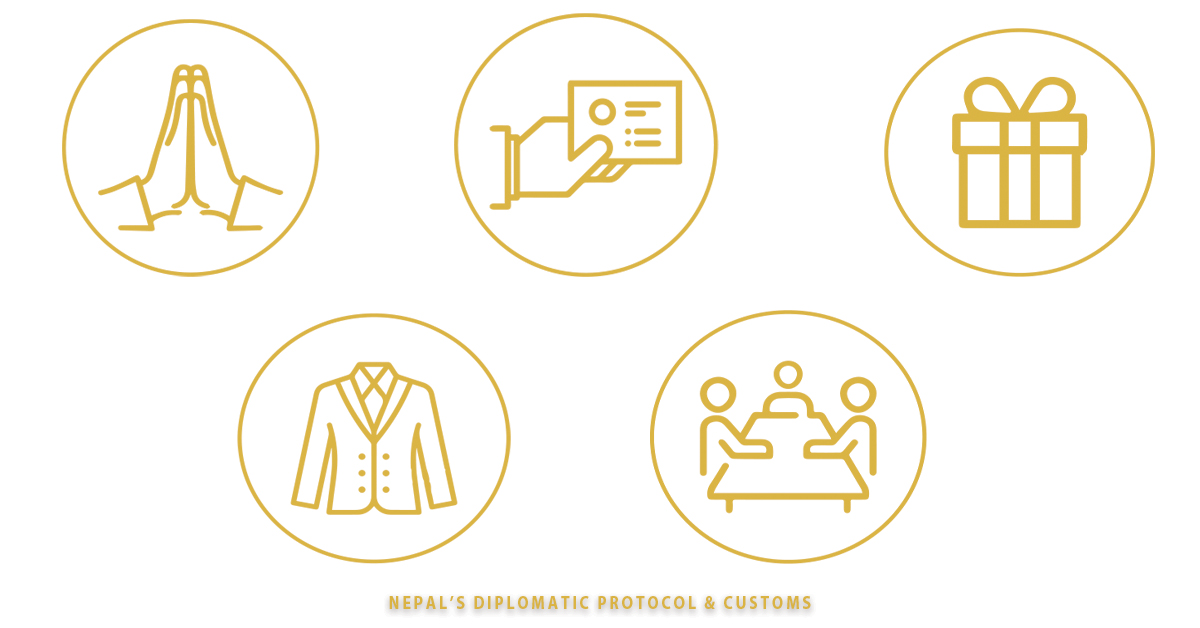A. Formal Greetings & Addressing Officials
- Namaste (नमस्ते) or Namaskar (नमस्कार) — the traditional greeting, performed with palms pressed together, is widely used in both official and social settings.
- Handshakes — common among men but not always necessary; a polite nod or verbal greeting may suffice, especially with seniors or religious figures.
- Respect for Hierarchy — Always greet the senior-most individual first, reflecting Nepal’s strong cultural emphasis on hierarchy and respect.
Use of Honorifics:
- The President — Right Honorable President [ and Name]
- The Prime Minister — Right Honorable Prime Minister [and Name]
- Ministers and Members of Parliament — Honorable [and Name]
- Ambassadors and high-ranking government officials — Your Excellency
B. Business Cards & Introductions
- Exchange business cards using both hands, and take a moment to respectfully glance at the card before putting it away.
- In formal introductions, always use full titles (e.g., Ambassador, Minister, Dr., Professor, Mr. Secretary) to reflect proper decorum.
C. Gift-Giving Customs
Diplomatic gifts symbolize goodwill and cultural respect. Choose items that reflect Nepalese craftsmanship or bilateral relations.
Suitable diplomatic gifts include:
- Handicrafts such as pashmina shawls, Thangka paintings, and artisanal artifacts.
- Premium Nepali tea or organic coffee.
- Books on Nepal’s culture, history, or diplomatic relations.
- Note: Avoid gifting leather items to Hindu officials, as cows are sacred in Nepalese tradition.
D. Diplomatic Dress Code in Nepal
- Formal Attire for Diplomatic Events
- Nepal adheres to international diplomatic dress codes while honoring local traditions.
For Men:
- Business/Formal: Dark suits with ties are standard for meetings and receptions.
- National Dress: Nepalese officials may wear Daura Suruwal during state functions. Foreign ambassadors and diplomats may also wear their national dresses on formal occasions.
- Black-tie Events: Tuxedos are expected for gala dinners and evening ceremonies if black tie events are specified.
For Women:
- Business/Formal: Tailored suits, sarees, or traditional dresses are appropriate.
- Cultural Attire: Sarees are often preferred for high-level meetings and receptions.
- State Banquets: Long evening gowns or elegant sarees are customary.
Special Notes:
- Adding a Nepali element, such as a pashmina or cultural accessory, is appreciated, particularly during National Day events.
- When visiting temples or religious sites, modest dress covering the shoulders and knees is preferable and often mandatory.
E. Event Etiquette & Official Ceremonies
Official Meetings & State Visits
- Punctuality: Being punctual is paramount; arriving 10–15 minutes early signals respect and professionalism.
- Seating Protocol: The highest-ranking official is seated centrally, with guests positioned according to diplomatic rank.
- Speaking Order: The host typically opens the discussion, followed by senior guests in order of precedence.
National Day & Diplomatic Receptions
Nepal’s National Day (September 20) is commemorated with formal receptions hosted by embassies abroad and by the government at home.
Attendance by diplomats is expected; greetings, brief speeches, and cultural participation are integral.
Toast Etiquette: Toasts at formal dinners are led by the President or Prime Minister, followed sequentially by Minister and other senior officials.
Invitations and RSVP Protocol
Formal invitations must be acknowledged promptly. If attendance is not possible, a courteously worded written note of regret should be sent.
Cultural Sensitivities & Social Etiquette
- Dining & Table Manners: It is customary to wash hands before meals. At a homely setting, use the right hand for eating, offering, or receiving items; the left hand is traditionally not preferred and considered impure. Forks and knives are used in restaurants and hotels. Removing shoes before entering a Nepalese home, temple, or some cultural venues is expected.
- Alcohol Etiquette: Alcohol may be served at state banquets and formal events. However, discretion is advised, particularly when engaging with officials from religious or traditional backgrounds.
Conclusion
Mastering Nepal’s diplomatic protocols requires more than adherence to formal rules; it demands sensitivity to deep-rooted cultural values and respect for traditional practices. A nuanced, respectful approach to greetings, dress, event participation, and social customs will ensure positive, enduring relationships in Nepal’s diplomatic landscape.


 21.36°C काठमाडौं
21.36°C काठमाडौं
